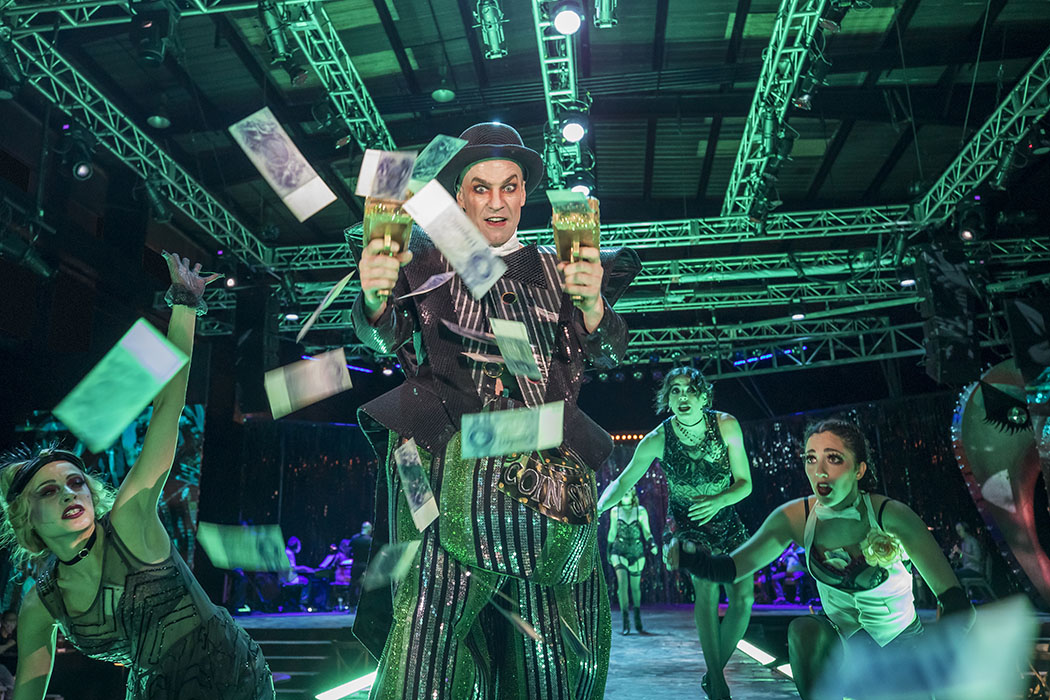There is no particular requirement that a theatre production plunge headlong into universal truths or take advantage of timely connections to current events. However, when those things do happen, the confines of a physical stage begin to dissolve and a dramatic power is unleashed that leads even the most reticent of theatre-goers into a session of unanticipated self-examination.
That seems to be the case with Atlanta Opera’s production of Cabaret that wrapped up an eight-performance run in June as part of the company’s Come As You Are Festival at Pullman Yards. Directed by Atlanta Opera artistic director Tomer Zvulun, this skillfully mounted production, overflowing with energy and edge, was able to transcend even its own lively and angular theatrical physicality and touch a 2022 audience in an elemental way. Sadly, this revelation comes with the realization that we—as audience—could be witnessing our own real-life tragedy of history painfully repeating itself.
Cabaret, based on the Christopher Isherwood novel and the stage play adaptation I Am a Camera by John Van Druten, opened on Broadway in 1966 with music by John Kander, lyrics by Fred Ebb, and with a script by Joe Masteroff. It was enormously successful and spawned an equally successful film by Bob Fosse. The work gained a substantial reimagining by director Sam Mendes that opened in London in 1993 and on Broadway in 1998 with choreographer Rob Marshall. Subsequent revivals, both in London and New York, have revealed the musical’s intriguingly edgy timelessness.
In this production in the former warehouse/industrial space of Pullman Yards, Zvulun and his design staff (scenic designer Alexander Dodge, lighting designer Marcella Barbeau, projections by Nicholas Hussong) have created a beautifully minimal set that becomes, theatrically, Berlin of the 1930s during the Nazi rise and grasp at power in Germany. A stage, augmented by a long runway, carries the action of the decadent Kit Kat Club, its Emcee (Curt Olds) and dancers, and its headliner, Sally Bowles (Aja Goes). A struggling American novelist, Clifford Bradshaw (Billy Tighe), comes to Berlin to absorb that atmosphere and write, but falls for Bowles despite her gold-digger approach to life and existence. The bi-sexual Bradshaw settles into a cheap boarding house run by Fräulein Schneider (Joyce Campana), and inhabited by her tenant/admirer, a Jewish shop owner, Herr Schultz (Anthony Laciura).
An uneasy symbolism pervades both setting and performances. In Act I, the entrance to the Kit Kat Club is an open mouth that suggests the rawest of entertainments and the most decadent of lifestyles. For Act II, the entrance has been turned around to reveal the open mouth of a skull. Embodying the symbolism of decadence was the Emcee, played here by Olds with a delicious slinking slyness that often exploded through his marvelous vocal control. It was this control that allowed him to present a gamut of emotions, from lyrical presenter to harsh victim of his own making.

Of course, Cabaret is musically memorable from the opening “Wilkommen” to the alternately uplifting and haunting variations on the title song, “Cabaret.” Energetically handled by a well-balanced 11-member ensemble of mostly brass and percussion, conducted by Francesco Milioto, the score weaves its way through the Emcee-led Kit Kat Club numbers, like the stunning “Money.” As Bowles, Goes offers a marvelous and poignant “Maybe This Time” as well as a forceful “Mein Herr.” Her anguished reprise of “Cabaret” with an achingly satirical sadness was a highlight.
Although the primary story revolves around Tighe’s Bradshaw and Goes’ Bowles, the secondary plot of the older Berliners taken by Laciura and Campana, was the more dramatically successful. Both marvelous singing actors able to embrace both strength and poignance, their duos “So What?,” “It Couldn’t Please Me More,” and “What Would You Do?” foreshadow, in a way, the loss of life and love that was to be the inevitable conclusion to both this work and the real-life Nazi antisemitism.
That tragedy seeps into the work at the end of Act I with a chilling reprise of the Nazi anthem “Tomorrow Belongs To Me” that is taken by Deborah Bowman in the role of Fräulein Kost. Signaling the solidifying of the Nazi control, this was where the production became more than a musical—and the audience had intermission to build up a sense of dread. One audience member was overheard to say “It was beautifully done, but I simply couldn’t bring myself to applaud.”
By the anguish of the powerful Finale, the inevitable universal truth of Cabaret takes hold and we grasp at last that this is a cautionary tale. Hopefully, we’ll be smart enough to understand the message.





